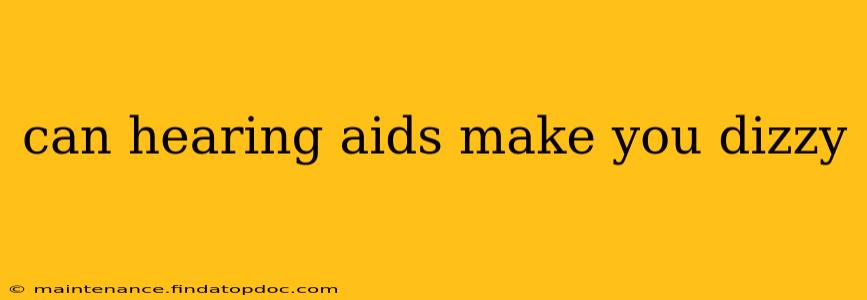Many people wonder if hearing aids can cause dizziness. While it's not a common side effect, dizziness can occur, and it's important to understand why. This article explores the connection between hearing aids and dizziness, offering insights into potential causes and solutions.
What Causes Dizziness with Hearing Aids?
Dizziness associated with hearing aids isn't usually caused by the hearing aid itself, but rather by the underlying issues that often accompany hearing loss, or by the adjustment period of getting used to amplified sound. Let's explore the key reasons:
1. Vestibular Issues and Hearing Loss:
Often, hearing loss, particularly sensorineural hearing loss, coexists with vestibular problems. The vestibular system in your inner ear is responsible for balance. Damage to this system, frequently occurring alongside hearing loss, can lead to dizziness, vertigo, or imbalance. A hearing aid doesn't cause this vestibular dysfunction; it merely highlights a pre-existing condition. The sudden influx of amplified sound can sometimes exacerbate the symptoms, leading to feelings of dizziness.
2. Sudden Changes in Sound Processing:
The brain takes time to adapt to amplified sounds. When you first start using hearing aids, the increased sound volume and clarity can overwhelm the brain, causing disorientation and dizziness in some individuals. This is particularly true for individuals with significant hearing loss who haven't used amplification before. This temporary dizziness usually subsides as the brain adjusts.
3. Incorrect Fitting or Programming:
Improperly fitted or programmed hearing aids can also contribute to dizziness. If the hearing aid isn't positioned correctly in the ear canal, it might interfere with the ear's natural pressure equalization, potentially causing discomfort and dizziness. Similarly, if the amplification settings are too high, the amplified sound can feel overwhelming and lead to disorientation.
4. Ear Infections or Blockages:
Underlying ear infections or blockages can independently cause dizziness, and these conditions might be exacerbated by wearing a hearing aid. The hearing aid might create pressure in the ear canal or trap moisture, potentially worsening an existing infection.
How to Minimize Dizziness from Hearing Aids
If you experience dizziness with your hearing aids, several steps can help:
1. Gradual Adjustment:
Start by wearing your hearing aids for short periods, gradually increasing the duration each day. This allows your brain to adjust to the amplified sound more comfortably.
2. Proper Fitting and Programming:
Ensure your hearing aids are professionally fitted and programmed by an audiologist. Regular check-ups and adjustments are crucial to maintain optimal comfort and performance.
3. Address Underlying Vestibular Issues:
If you suspect underlying vestibular problems, consult an ENT specialist or a vestibular therapist for diagnosis and treatment. They can help determine the source of your dizziness and recommend appropriate therapies.
4. Communication with Your Audiologist:
Open communication with your audiologist is key. Report any dizziness or discomfort you experience immediately. They can make adjustments to your hearing aids or suggest other strategies to alleviate your symptoms.
5. Consider Different Hearing Aid Styles:
Certain hearing aid styles might be more comfortable than others, depending on your ear anatomy and sensitivity. Discuss your options with your audiologist to find the best fit.
When to Seek Medical Attention
While occasional dizziness is sometimes expected during the adjustment period, persistent or severe dizziness warrants immediate medical attention. Consult your doctor or audiologist if:
- Dizziness is severe or persistent.
- Dizziness is accompanied by other symptoms like nausea, vomiting, or vision changes.
- You experience sudden onset of dizziness.
By understanding the potential causes of dizziness related to hearing aids and taking proactive steps, you can maximize the benefits of hearing amplification while minimizing discomfort. Remember, open communication with your healthcare providers is vital for successful hearing aid use.
